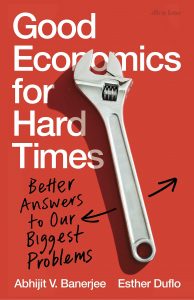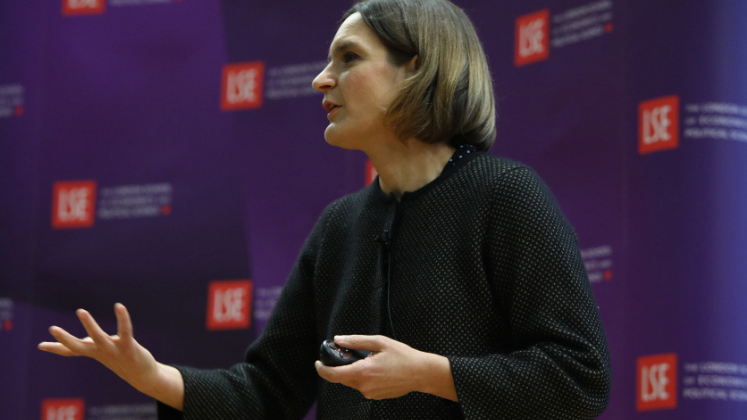In Good Economics for Hard Times: Better Answers to Our Biggest Problems, Nobel-Prize winning economists Abhijit V. Banerjee and Esther Duflo carefully lay out evidence to provide a grounded approach to tackling today’s most pressing global problems. With a focus on alleviating inequality and poverty, Banerjee and Duflo’s book clears a path for more interdisciplinary work centred on improving citizens’ wellbeing and protecting human dignity, writes Shruti Patel.
If you are interested in this book, you may like to watch a video of the authors speaking at an LSE event recorded on 17 June 2020.
This book review has been translated into Mandarin by Darren Cheong (LN814, teacher Dr Lijing Shi) as part of the LSE Reviews in Translation project, a collaboration between LSE Language Centre and LSE Review of Books. Please scroll down to read this translation or click here.
Good Economics for Hard Times: Better Answers to Our Biggest Problems. Abhijit V. Banerjee and Esther Duflo. Penguin Random House. 2019.
 It’s rare for economists to highlight how little is known about which policies and institutions fuel economic growth and prosperity. But in their latest book, Good Economics for Hard Times, Nobel Prize-winning economists Esther Duflo and Abhijit V. Banerjee do exactly that. And it’s this quality of humility and courage, espoused throughout their writing, that inspires confidence and curiosity in what they have to say about other, potentially more important, issues.
It’s rare for economists to highlight how little is known about which policies and institutions fuel economic growth and prosperity. But in their latest book, Good Economics for Hard Times, Nobel Prize-winning economists Esther Duflo and Abhijit V. Banerjee do exactly that. And it’s this quality of humility and courage, espoused throughout their writing, that inspires confidence and curiosity in what they have to say about other, potentially more important, issues.
Each chapter of the book tackles a big question of global relevance – many of which the reader has likely pondered or even debated over the dinner table. Questions like: should people vote for politicians that favour immigration? How might we avert climate Armageddon? Does welfare or cash handouts make people lazy? And what impact will automation have on jobs and welfare? Despite the contentious and divisive nature of these topics, the authors manage to orchestrate a balanced debate, engaging with the entire spectrum of research, evidence and public opinion.
Their approach is to synthesise the results of empirical work on these topics primarily through randomised controlled trials (RCTs) and natural experiments. These are studies in which people are allocated at random to either receive an intervention (usually a product or service) or be part of a control group that receives no intervention at all. The aim is to measure and compare the outcomes of those that did receive the intervention and those that didn’t. The findings of these studies are then compared to what is predicted by economic theory, often revealing stark differences. Whilst this would probably not surprise those acquainted with the study of economics, the implied nullification of key economic concepts and theories calls for a marked shift in the way economics is taught, studied and interpreted.

On immigration, for example, the authors show that contrary to the law of supply and demand, the influx of low-skilled workers hasn’t really affected local wages in most countries. The chapter on trade more or less debunks a foundational economic model — Ricardo’s Law of Comparative Advantage, which describes how countries are better off under free trade. Particularly compelling is the narration of India’s response to massive trade liberalisation in the early 1990s. Contrary to the purported uniformly distributed ‘gains’ from trade, there were sharp variations in the way liberalisation impacted poverty in the country – some benefitted far more than others.
This divergence between actual experience and economic models or theory is explained by ‘stickiness’ – a concept which theoretical models assume away:
Economics imagines a world of irrepressible dynamism. People get inspired, change jobs, turn from making machines to making music, quit and wander the world […] Manchester is reborn as Manchester digital, Mumbai turns its mills into upmarket housing and shopping malls, where those who work in finance spend their newly fattened pay-cheques.
However, ‘stickiness’ suggests that people and processes are slower in adapting to change than we might think or want. Old habits die hard and money can influence some types of behaviours – but not all, not instantly and certainly not for everyone.
The repercussions of ‘stickiness` are so profound, the authors argue, that an entirely different approach to economic policy formulation is needed – one that relies on experiments and real data more than on theoretical models and prediction. This is not surprising given that the authors are strong proponents of RCTs as a tool for designing economic and social policies. The other major implication is that the ultimate objective of policies themselves, at least in developed countries, needs to change too. Today, even in the Global North, when one hears of a certain policy recommendation in political and public spheres, it is almost always justified on the grounds of economic growth. This is ‘bad economics’, write the authors, not least because little is known about what causes growth. ‘Good economics’, on the other hand, especially in hard and uncertain times, places much greater emphasis on policies that tackle inequality and support resilience.
This attention to equality and justice is also notable in the authors’ responses to the other big questions the book addresses. On how to tackle climate change, they write about the inadequacy of clean technology and green growth to solve what is at heart an ethical – not a technical – question: shouldn’t rich countries consume fewer luxuries so that citizens in poorer countries can have some of life’s essentials? On that basis, they emphasise the role of policy in influencing individual behaviour, habits and norms. Specifically, they call for interventions that marry psychology and economics. A carbon tax, for instance, combined with simpler measures such as better labelling, has proven effective in gently nudging people towards more preferable behaviours and decisions.
The chapter on social welfare, cash transfers and universal basic income delves into the recent history of the US welfare system, explaining how the topic is heavily politicised and showcasing once again the huge contrast between popular ‘wisdom’, what economic theory predicts and actual experience. The evidence referred to is borne out of the large number of studies looking at the experience of 1 billion people in over 100 countries that have received either conditional or unconditional cash transfers since 2014. The authors write that: ‘There is no evidence that cash transfers make people work less.’
Many might find this surprising – why would you work if you did not need the money to survive? In fact, economic theory provides explanations for effects in both directions. However, as the authors highlight, much attention has focused on the possible negative effect on labour supply. It’s assumed people will ‘spend’ any extra income they receive on leisure by working less. Poorly acknowledged is that transfers can increase work by giving households a basic living standard which enables them to be productive workers, and by reducing credit constraints so that businesses can open and grow. By therefore comparing theoretical predictions with real-world experience, the authors illustrate how a fallacy has pervaded media and rhetoric, and they use this to once again make a case for evidence-based policymaking.
On AI and robot-induced fears, we learn that while economists’ views on the impact of automation diverge greatly, the real challenge is for governments to put in place policies that help those who are most at risk to adapt. Some answers are provided – certain types of training programmes, for example, but this seems beside the point. Instead, a careful recollection of the history of technological progress, its interplay with politics and the ultimate effects on inequality and poverty is enough to drive the point home.
Filled with personal anecdotes and experiences, the book provides a grounded bird’s-eye view of policy debates that are shaping the discourse on today’s most pressing global problems. Furthermore, in carefully laying out the evidence and not preaching dramatic solutions, the book imparts an important lesson to anyone engaged in scholarly work: be less strident with your views. Every question has multiple answers. And new findings can easily overturn well-established ‘knowns’.
Undoubtedly, though, the authors’ biggest contribution stems from a recurrent critique levied throughout the book against the economics profession’s obsession with growth. They repeatedly underline the shortcomings of using financial incentives to influence behaviour. Many a time, they illustrate how the line between economics, psychology and communication, as well as the distinction between micro- and macroeconomics, is an unhelpful construct. ‘Economics is too important to be left to economists.’ In making this argument, Banerjee and Duflo clear a path for more interdisciplinary work centred on improving citizens’ wellbeing and protecting human dignity.
Note: This review gives the views of the author, and not the position of the LSE Review of Books blog, or of the London School of Economics.
Banner Image Credit: Photo by Daniel Hansen on Unsplash.
In-text Image Credit: Photograph of Esther Duflo, co-author of Good Economics for Hard Times and joint winner of the 2019 Nobel Prize in Economic Sciences, speaking at LSE for the Stamp Memorial Lecture (LSE in Pictures, copyright LSE).
《困难时期的良好经济学: 对世界最大的问题更好的回答》 Good Economics for Hard Times: Better Answers to Our Biggest Problems. Abhijit V. Banerjee and Esther Duflo. Penguin Random House, 2019.
Review translated by Darren Cheong (LN814, teacher Dr Lijing Shi)
 很少经济家会高调承认他们其实不知道哪些政策或者机构能推动经济增长、促进繁荣。但诺贝尔奖获得者Esther Duflo 和 Abhijit Banerjee 在他们最新的著作《困难时期的良好经济学》中就这样做了。这种谦虚和勇敢的品质会激发读者们的信心与好奇心, 从而去留意相关的问题。
很少经济家会高调承认他们其实不知道哪些政策或者机构能推动经济增长、促进繁荣。但诺贝尔奖获得者Esther Duflo 和 Abhijit Banerjee 在他们最新的著作《困难时期的良好经济学》中就这样做了。这种谦虚和勇敢的品质会激发读者们的信心与好奇心, 从而去留意相关的问题。
该书的每一章分析一个全球大问题 – 很多问题是广大读者已经沉思过的, 或者在餐桌上讨论过。比如:我门应该投票给赞成移民的政治家吗?我们如何面对气候危机?福利或收入保障会鼓励人们变懒惰吗?自动化技术对工作和福利会造成什么样的影响?这些问题常常引发争议和分歧,但作者们有效地融汇大量的研究,证据和公众意见,进行不偏不倚的的讨论。
他们的方法是主要通过随机对照试验 (RCT) 和自然实验来综合这些主题的实证研究结果。在这些研究中,人们被随机分配接受干预(通常是产品或服务)或成为完全不接受干预的对照组的一部分。目的是衡量和比较试验组和对照组的结果。然后将这些研究的结果与经济理论的预测进行比较,通常会揭示出明显的差异。虽然这可能不会让熟悉经济学研究的人感到惊讶,但关键经济概念和理论的隐含无效要求意味着经济学的教学、研究和解释方式都应有所转变。例如,在移民问题上,作者表明,低技能工人的涌入并未真正影响大多数国家的当地工资;这与供求规律相悖。

In-text Image Credit: Photograph of Esther Duflo, co-author of Good Economics for Hard Times and joint winner of the 2019 Nobel Prize in Economic Sciences, speaking at LSE for the Stamp Memorial Lecture (LSE in Pictures, copyright LSE).
关于社会福利、现金转移 (cash transfer) 和全民基本收入的章节深入探讨了美国福利制度的近期历史,解释了该话题如何被严重政治化,并再次展示了流行“智慧”、经济理论预测和实际经验之间的巨大反差 。 它所提及的研究证据来自2014 年以来100 多个国家的 10 亿人接受有条件或无条件现金转移支付经历。作者写道:“没有证据表明现金转移支付让人们少工作。”
有许多人有可能会觉得惊讶。如果人不需要钱就能生存,为何还要工作呢?其实,经济学理论有对这个矛盾效果有双向的解释。可是,正如作者强调的,大众的注意力集中在对劳动力供应的负面影响上。它假设人们会把他们减少工作那部分的“外快”都花在休闲上。却忽略了,现金转移也能够通过为 家庭提供基本生存保障, 从而 使成员成为更有生产力的劳动者。在企业方面,现金转移能减少信贷限制从而促进企业发展。通过比较理论预测与现实经验的, 作者展现了媒体与舆论对社会福利这个话题充满了误会与偏见,并再次强政策的制定应该采取循证的模式。
对人工智能与机器人所带来的影响,我们知道经济家们的看法天差地别。但真正的挑战是政府如何为最可能被自动化负面影响的人制定扶持政策。作者也提供了一些答案,比如某些类型的培训方案,但这似乎跑题。其实认真回顾历史就足够了,我们可以看到技术发展的历史,及其发展过程与政治的互相作用、以及对发展对不平等和贫困最终的影响。
这本书提供了丰富的个人佚事和经验,高屋建瓴,构建当下最紧急国际问题的政策辩论。而且该书细致地展现证据,不宣传激进的解决方案,也警示所有从事社会科研者:我们应该对自己的观点多加反省,少一点声嘶力竭。每个问题都有多个答案。新的研究发现以轻易地驳斥“大众智慧”。
毫无疑问,作者最大的贡献来自他们反复批评经济学界对增长的痴迷。他们不断指出用财务激励措施来影响社会行为的弊端。他们多次展示经济学,心理学和传播学之间的界线以及微观经济学和宏观经济学之分是多么无益的划分。“经济学是如此重要以至于不能只留给经济学家去做贡献。”在提出这一论点时,两位作者为提升世界公民的福祉和保护人类尊严的跨学科工作开拓了道路。








1 Comments